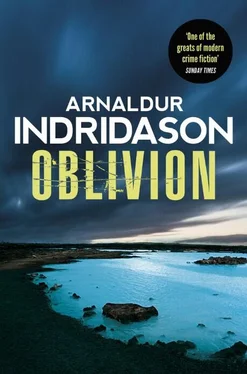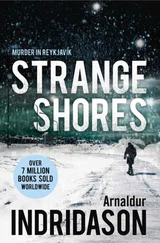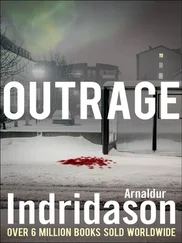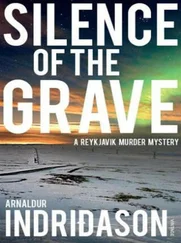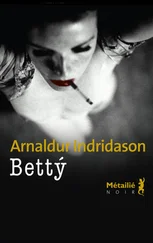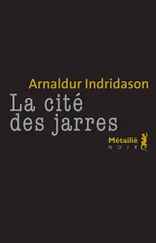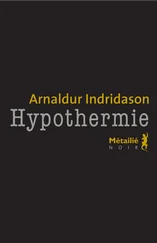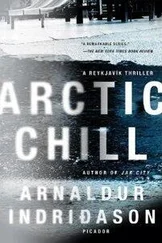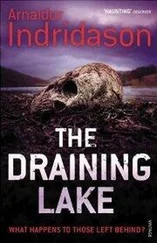‘Well,’ she said, ‘come in then.’
‘Thank you.’ Erlendur entered the small flat. The woman turned on the lights and went into the kitchen to put away her shopping. Then she re-emerged, took off her coat and hung it in a cupboard.
‘Don’t just stand there,’ she said. Erlendur had not dared to go into the sitting room without permission and was still hovering by the door. ‘Go on, sit down. Excuse the state of the place. I’m not used to visits like this and to tell the truth I don’t like ’em.’
‘No, I’m sorr—’
‘Don’t waste time apologising, just get on with it and tell me what you want. Wait a moment, though. I should make us some coffee.’
With that she went back into the kitchen and before long a strong aroma of coffee wafted into the sitting room. As he took in his surroundings, Erlendur reflected that she had no need to be ashamed of her housekeeping. Despite the signs of poverty — the shabby old furniture, the lack of all ornaments apart from a few family photos — everything was spick and span. The photographs appeared for the most part to be of her children, grown up and surrounded by their own families. An impressively large group. One daughter had died, he knew, and one of her sons was well known to the police and often on the streets. He’d been in trouble from a young age and still got on the wrong side of the law from time to time. He had crossed Erlendur’s path now and then when he was an officer on the beat. There was an old photo of him with his brothers and sisters, and this made Erlendur feel oddly uncomfortable, as if he had been forced into a closer intimacy with the man than he would have liked.
‘They didn’t half make a fuss about that girl,’ Baldvina remarked as she came in with the coffee.
‘Yes, well,’ said Erlendur, removing his gaze from the photos. ‘It was a terrible business.’
‘I don’t know how I can help. Hasn’t everyone forgotten all about it?’
‘I gather you were a single mother at the time. It must have been a hard slog bringing up five children on your own,’ said Erlendur, his eyes returning to the pictures.
‘I had kids by three men,’ said Baldvina. ‘A mixed bunch. The first was a boozer, no use to anyone. The second was good to me. We had a decent life, had three kids together but then he went and died and left me on my own, and I had no choice but to move into the camp. He had an accident in Hvalfjördur. He was all right, the poor sod; he couldn’t help what happened to him. The last one used to knock me about. Biggest piece of shit I ever met. There weren’t any more and I’m bloody glad about it and that’s a fact.’
Erlendur wasn’t sure how to respond to this.
‘Yes, the camp was a rough place,’ continued the woman. ‘I’m not one to grumble but it wasn’t easy.’
‘They weren’t good places to live in, were they?’ said Erlendur. ‘The huts, I mean.’
‘Good places to live in! Are you joking? Some of them may have been better than others but the ones I knew weren’t fit for people. They were damp and cold and leaked and the smell of mould used to get into your clothes — “the smell of the camp”, they called it. All you had to heat the place was a small oil stove, and oil cost an arm and a leg, and the hut never got properly warm. But the housing shortage was so dire you just had to put up with it. Families used to be squashed in three or four to a hut, with one small room each. Don’t know what people would say to that nowadays. And the men used to get smashed out of their skulls and you’d have a hell of a time trying to see the buggers off.’
Baldvina took a mouthful of coffee, her gnarled fingers crooked around the cup.
‘But the worst was the chill from the floor,’ she said. ‘You couldn’t put the children down at all for the cold, and water used to collect under it during the spring thaw and flood up into the hut. Then there were the open sewers, and the rats...’
She stared down into her coffee cup.
‘It’s always the kids who come off worst in dumps like that,’ she added, and Erlendur saw her gaze flicker to the photo of her son, the homeless alcoholic.
‘You said you remembered Dagbjört walking past on her way to and from school?’
‘Yes, though I was never sure. They showed us pictures and I thought it was the girl who walked past sometimes, but that’s all I could tell them. I knew nothing about her. Never saw her in the camp. Then I heard she was supposed to have had the hots for a boy there but I didn’t know anything about that either. Mind you, my friend Begga reckoned she’d been hanging about there, or a girl who looked like her, anyway. Begga lived in the hut next door. Died years ago. Don’t know if the police ever talked to her.’
‘Begga?’ said Erlendur, unable to recall any reference to her in the files. ‘I don’t think so.’
‘She told me once, when I bumped into her years later and we got talking about it, that one of the lads had moved out of the camp around the same time. Begga reckoned it was Stella’s boy and that he left because of some business with a girl. Though it needn’t have been that girl, I don’t think. But maybe you could talk to my son Vilhelm. He may’ve known the lad. I have a feeling they were the same sort of age.’
‘Stella’s son? Who was Stella?’
‘Oh, she had it tough, poor thing. I didn’t see much of her after we moved out of the camp. Heard a few years ago that she was dead.’
‘Do you know which boy it was? What he was called?’
‘No, I don’t. She had several sons. I expect he went off the rails like some of the other kids from the camp.’ Baldvina looked back at the photo.
‘Where can I find Vilhelm?’
‘God knows. He’s on the streets. Never been able to stick at anything. He’s well meaning, though. Heart’s in the right place. He came out of it worst of all my lot.’
‘Out of Camp Knox?’
‘Camp Knox was that sort of place.’
Erlendur pictured her son now, a frail homeless man with broken glasses. He had once dossed down in a hot-water pipeline, back when Erlendur was investigating the death of another tramp who had long been living rough and had ended up drowned in the old peat diggings in Kringlumýri.
Baldvina’s eyes were lowered to her arthritic hands.
‘No one was that bothered just because some girl had done herself in.’
It was late afternoon when Caroline finally answered the phone. She remembered Marion straight away. Marion wondered if it would be possible to meet her to ask a favour. Although initially reluctant, Caroline yielded in the face of Marion’s polite insistence, said she was free that evening and suggested a time and place. Marion asked if they could meet in private. Caroline took a moment to grasp what was required.
‘Somewhere off the beaten track would be best,’ said Marion. ‘I need to meet you where we can be sure we won’t be disturbed.’
‘Excuse me?’
‘If there’s some way you could arrange that, I’d be very grateful.’
‘Why?’
‘Also it would be better if you didn’t mention our meeting to anyone.’
‘Why... why all the secrecy?’
‘We’d like to proceed with caution,’ said Marion. ‘We trust you. And we don’t know anyone else on the base. We won’t try and force you to do anything you don’t want to. I promise.’
Eventually, after a lengthy pause for thought, Caroline agreed to these conditions. Evidently she was less than enthusiastic about a clandestine meeting with the Icelandic police in connection with a murder that, in her opinion, had nothing to do with her or the US military. She said as much to Marion, adding that she didn’t know what they expected of her. Marion asked her to be patient, to listen first before deciding whether or not to help them.
Читать дальше
